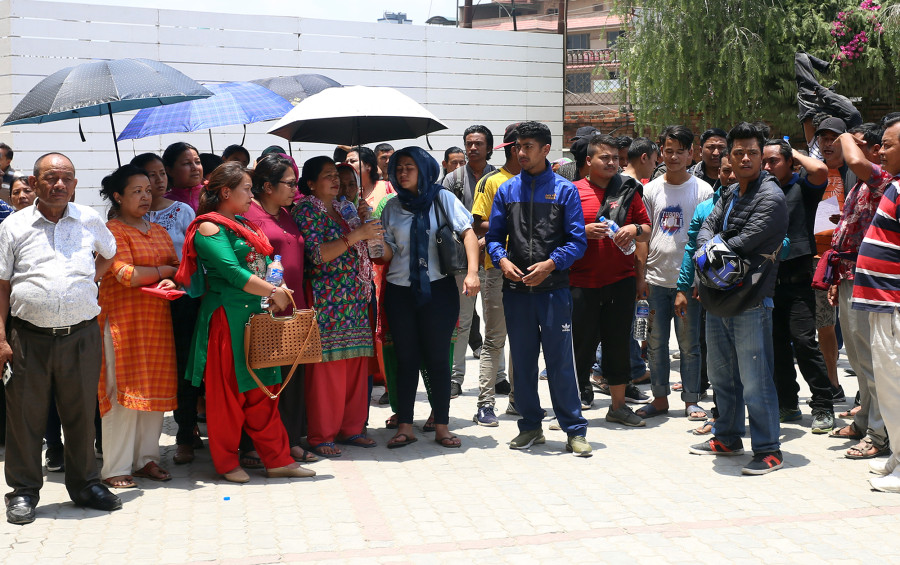National
Doctors alarmed by the assaults they are facing at the hands of family of deceased
Relatives usually allege doctors of negligence, but medical professionals say the issue needs to be dealt with more carefully
Arjun Poudel
Of late, doctors at Dadeldhura Sub-regional Hospital have not been examining patients alone. They are providing outpatient care in the presence of security personnel, municipality guards and hospital staffers.
“We have not been able to go out of our quarters,” Dr Jitendra Kandel, medical superintendent of the hospital, told the Post over the phone. “Because we are worried about our security.”
The situation at the hospital remains tense even six days after the death of a patient.
Gita Tamrakar, a local of Amargadhi municipality, died of postpartum haemorrhage in the hospital on June 14.
Dr Kandel said that the patient, who gave birth to a child at the hospital through caesarean section some two weeks ago, died on Friday. “We tried our best to save her but could not,” he said.
Following the death of the patient, her family members and relatives gheraoed the hospital, destroyed hospital’s infrastructure, including the operation theatre, alleging that the 26-year-old woman died due to the negligence of doctors.
Enraged family members also blocked the roads and cordoned off the hospital and district administration office demanding a fair investigation.
Operation services at the hospital have been suspended for an indefinite period, and patients are being referred to hospitals in Nepalgunj, which is more than an eight-hour drive from the district headquarters.
The situation is not limited to Dadeldhura. There is a growing concern among doctors in different parts of the country, including the Capital as well, who say providing medical care is becoming tougher by the day, as every time something wrong goes with patients during the treatment, they have to bear the brunt, as family members jump to the conclusion that doctors are negligent.
Every time there is any such incident, the concerned hospital and the Nepal Medical Council, which is the regulatory agency of medical doctors, form a probe team. But the report largely fails to find anyone guilty, as most cases end after the concerned hospital pays compensation to the family.
“No doctor has ever been found guilty,” said Dr Muktiram Shrestha, chairman of Nepal Medical Association. “And no action has ever been taken against anyone who manhandled the doctors and destroyed the hospital properties.”
According to Shrestha, incidents of conflict between doctors and family members have also been increasing.
Last week, Rampiyari Thapa Magar, 50, of Dorambha of Ramechhap district died two days after a gallbladder surgery at Om Hospital and Research Centre.
Family members accused the doctors of negligence.
After they picketed the hospital, police had to be deployed to disperse the crowd.
Family members refused to receive the body. The team of doctors involved in the surgery maintained that it was a complicated case and that there was no negligence on the part. Ultimately, the hospital settled the case by paying compensation and exempting the treatment bills.
Dr Dhundi Raj Poudel, an ethical committee member of the Nepal Medical Council, attributed these events of attacking the doctors to government’s failure to maintain law and order. He admitted that most of the cases are settled through compensation.
“The council also wants fair investigation, but most of the cases are settled through compensation,” said Poudel. “Even the probe team does not get proper support from the victims’ side, especially when chances of getting compensation are slim.”
Last month, five-year-old Aakriti Kumari Sah of Sisaudiya Municipality in Sarlahi district, who underwent heart surgery at Shahid Gangalal National Heart Centre died in the course of treatment. Her family members alleged that Sah died of an acute haemolytic transfusion reaction.
Copies of the haematology report obtained by the Post shows Sah’s blood type as ‘O’ positive. However, relatives were asked to arrange for ‘A’ positive blood, according to a copy of the prescription seen by the Post.
To investigated the matter, the hospital and the Nepal Medical Council formed separate probe teams. A report was furnished, but no action has been taken against anyone.
Sah’s relative Surendra Yadav said that the probe team gave a report which says the cause of death is not ‘determined’. The body still remains in the hospital.
Dr Sushilnath Pyakurel, chief specialist at the Ministry of Health and Population, said that doctors have become more money-oriented instead of service-oriented.
“Lack of communication between doctors and patients or their relatives is the main cause of all such problems,” said Pyakurel, “If doctors communicate well with the family about the seriousness of the ailment, such problems can be averted.”
Jyoti Baniya, chairman of the Forum for Protection of Consumers Rights, said there is a significant rise in the number of deaths during treatment and that this is something authorities concerned must look into.
“Yes, at times patients die during the course of treatment despite efforts to save them,” said Baniya.
“But it’s time the authorities looked into why there is a rise in the number of such incidents. There could also be problems with the quality of doctors.”




 9.83°C Kathmandu
9.83°C Kathmandu














